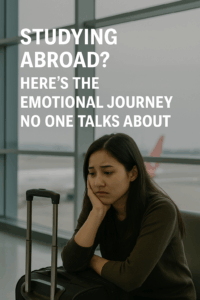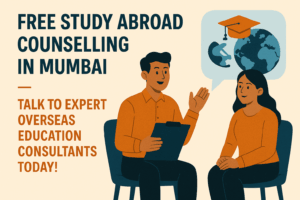Call Us:+91-9920234749, +91-9833420909 info@studyandworkabroad.in
Top 10 Mistakes Students Make When Applying to Study Abroad (and How to Avoid Them)
Studying abroad is an exciting adventure that gives you a lot of chances to grow as a person and in your career. Getting through the application process, on the other hand, can be difficult if you aren’t familiar with it.
Students often need to correct their process of going to study abroad, like not picking the right program or not being able to get a scholarship. You can escape these problems by first being aware of them.
Many international students make ten big mistakes. This article discusses those mistakes and how to avoid them. This guide by Study And Work Abroad will help you enjoy studying abroad, whether you are just considering your options or already applying.
Top 10 Mistakes Made While Applying to Study Abroad
Here is a list of top 10 mistakes made by students while applying to a foreign university for studying abroad. Also, we have suggested ways to avoid these mistakes.
#1 Choosing the Wrong Program
Students do not align their career goals with the degree they want to pursue. A lot of the time, students pick a course that doesn’t help them get the job they want. While a college or program may be well-known, there may be better choices for you.
To avoid making this mistake, look into courses that will help you reach your goals. Think about what you have studied in the past, what skills you want to learn, and what you want to do in the future. Study abroad consultants can help you determine how the right course can help you succeed.
#2 Common Application Errors
Students make silly mistakes while filling out the form and miss out on detailed documents. Many people lose their ideal college positions by filling out application forms improperly, needing more paperwork or forgetting deadlines.
Please review your application twice before you send it in. Set alarms for important dates, and consider making a list of what you need to take with you. Also, have someone else look it over to ensure it is correct.
#3 Underestimating the Cost of Study
Many students only consider the cost of tuition. They also need to remember the living expenses for food, fuel, housing, and social events. This could cost you a lot of money in the future. Make a thorough budget that lists all the costs you might have.
You can use online cost-of-living tools and talk to current students to get a good idea of how much it will really cost to live in the country you want to move to. If you can manage, join some part time job to pay your rent and other social expenses.
#4 Missing Out on Scholarships
Even though scholarships and other forms of financial help can make studying abroad much easier, many students either don’t apply or miss out because their applications aren’t complete.
As soon as possible, look into scholarship choices. Seek university-specific and external financial support. Make sure that you send in your application on time. Make sure that your writings meet the requirements for the grant to improve your chances of getting the scholarship.
#5 Incorrect information on Visa Regulations
They are critical to your overseas education goal. You must put the correct information on the visa and attach the correct documents. Incorrect information or missing documents can lead to visa rejection or delays.
To prevent this mistake, carefully read the visa rules for the country you want to visit. If you need help, talk to the office for international students at your university or an immigration consultant. Also, remember to check the validity of your passport.
#6 Ignoring Health Insurance
Many people forget that they need health insurance, but in many places, it is necessary—countries like UK, Canada, Germany, Australia and New Zealand mandate insurance. Healthcare costs can be very high if you don’t have the right insurance.
Find out what the health insurance rules are in the country where you are going to stay. Many schools offer health insurance to international students. If you need to, you can also look into private options.
#7 Over or Under Packing
It might take a lot of work to get ready for a long trip abroad. Overpacking can leave you burdened with excess luggage while underpacking might lead to missing essential items.
Do some research on the weather and customs of the place you’re going before packing your stuff. Make a list of important items and stick to it when you pack. Bring only a little with you; you can always buy more when you get there.
#8 Lack of Cultural Preparation
When you move to a new country, getting used to a new time zone is more than just getting used to it. You need to research cultural norms and expectations and understand them well so that you don’t offend the people who live there.
If you want to avoid making this mistake, learn about the customs, practices, and rules of your host country. It means knowing how to communicate and follow local traditions. With a little planning ahead, you can change quickly and make a good impression.
#9 Not Enough Networking
Several students only worry about their studies and miss out on the chance to make valuable professional and social connections. Making connections is important for getting training, jobs, and friends for life.
Get involved with your friends by joining student groups and going to events where you can meet new people. Try to get in touch with teachers, mentors, and people who work in your field. You can also use LinkedIn to make new connections in your new country.
#10 Poor Time Management
Managing a social life, learning, and part-time work can be challenging, especially if you are studying somewhere new. Students who need to learn to manage their time well can get too busy and burn out or have trouble in school.
Use a time management app to keep track of your daily tasks and avoid making this mistake. Set attainable goals, manage your workload, and schedule time for yourself. Remember to strike a balance between college and personal life.
Conclusion
It can be hard to get into a foreign university, but if you avoid these common mistakes, the process will be easier and more fun. You may need to put in a little more work to do well as an international student, from choosing a college to organizing your time.
Remember that studying abroad goes beyond grades. Meeting new people and working in a new setting are equally important. Use this amazing opportunity to discover new places and have great experiences by planning beforehand. Ask an overseas education consultant to get great advice from their own experiences.


